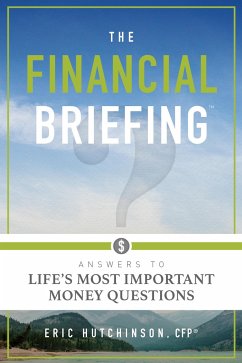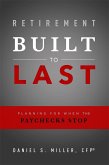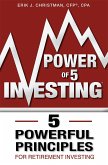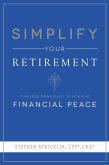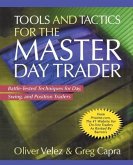14,99 €
inkl. MwSt.
Versandfertig in über 4 Wochen

7 °P sammeln
- Broschiertes Buch
- Merkliste
- Auf die Merkliste
- Bewerten Bewerten
- Teilen
- Produkt teilen
- Produkterinnerung
- Produkterinnerung
Your Personal Guidebook To FINANCIAL PEACE OF MIND--FOR A LIFETIME Financial uncertainty accompanies us at every stage of life--not just in the years surrounding retirement. But it doesn't have to be that way. Eric Hutchinson knows money is a key factor in maintaining a level of comfort and peace of mind, regardless of age. In The Financial Briefing, he reveals distilled wisdom based on over thirty years of professional experience and provides an overview of many of the financial and life issues everyone will face at some point. With the quick and easy-to-understand answers in this book, you…mehr
Andere Kunden interessierten sich auch für
![Retirement Built to Last Retirement Built to Last]() Daniel S MillerRetirement Built to Last14,99 €
Daniel S MillerRetirement Built to Last14,99 €![Power of 5 Investing Power of 5 Investing]() Erik J ChristmanPower of 5 Investing14,99 €
Erik J ChristmanPower of 5 Investing14,99 €![Simplify Your Retirement Simplify Your Retirement]() Stephen StricklinSimplify Your Retirement14,99 €
Stephen StricklinSimplify Your Retirement14,99 €![Your Financial Revolution Your Financial Revolution]() Danielle HowardYour Financial Revolution14,99 €
Danielle HowardYour Financial Revolution14,99 €![El Camino: Acelera Tu Viaje Hacia La Libertad Financiera / The Path El Camino: Acelera Tu Viaje Hacia La Libertad Financiera / The Path]() Tony RobbinsEl Camino: Acelera Tu Viaje Hacia La Libertad Financiera / The Path14,99 €
Tony RobbinsEl Camino: Acelera Tu Viaje Hacia La Libertad Financiera / The Path14,99 €![The Wall Street Journal Complete Money and Investing Guidebook The Wall Street Journal Complete Money and Investing Guidebook]() Dave KansasThe Wall Street Journal Complete Money and Investing Guidebook17,99 €
Dave KansasThe Wall Street Journal Complete Money and Investing Guidebook17,99 €![Tools and Tactics for the Master Day Trader (Pb) Tools and Tactics for the Master Day Trader (Pb)]() Oliver VelezTools and Tactics for the Master Day Trader (Pb)57,99 €
Oliver VelezTools and Tactics for the Master Day Trader (Pb)57,99 €-
-
-
Your Personal Guidebook To FINANCIAL PEACE OF MIND--FOR A LIFETIME Financial uncertainty accompanies us at every stage of life--not just in the years surrounding retirement. But it doesn't have to be that way. Eric Hutchinson knows money is a key factor in maintaining a level of comfort and peace of mind, regardless of age. In The Financial Briefing, he reveals distilled wisdom based on over thirty years of professional experience and provides an overview of many of the financial and life issues everyone will face at some point. With the quick and easy-to-understand answers in this book, you will have the knowledge and resources needed to make money a positive force in your life. Put your money worries to rest, and learn tactics to: - develop a blueprint for your financial future - navigate critical money decisions at each stage of life - hold meaningful money conversations with family
Hinweis: Dieser Artikel kann nur an eine deutsche Lieferadresse ausgeliefert werden.
Hinweis: Dieser Artikel kann nur an eine deutsche Lieferadresse ausgeliefert werden.
Produktdetails
- Produktdetails
- Verlag: Advantage Media Group, Inc.
- Seitenzahl: 232
- Erscheinungstermin: 6. Mai 2016
- Englisch
- Abmessung: 229mm x 152mm x 12mm
- Gewicht: 318g
- ISBN-13: 9781599326597
- ISBN-10: 1599326590
- Artikelnr.: 44842241
- Herstellerkennzeichnung
- Libri GmbH
- Europaallee 1
- 36244 Bad Hersfeld
- gpsr@libri.de
- Verlag: Advantage Media Group, Inc.
- Seitenzahl: 232
- Erscheinungstermin: 6. Mai 2016
- Englisch
- Abmessung: 229mm x 152mm x 12mm
- Gewicht: 318g
- ISBN-13: 9781599326597
- ISBN-10: 1599326590
- Artikelnr.: 44842241
- Herstellerkennzeichnung
- Libri GmbH
- Europaallee 1
- 36244 Bad Hersfeld
- gpsr@libri.de
ERIC HUTCHINSON, CFP®, has over thirty years of experience in the areas of financial planning, investments, estate planning, and tax planning. In addition to practicing as a financial planner, Eric is a speaker, author, and frequent television guest on both national and local platforms. He currently serves on several nonprofit boards, including the Arkansas Community Foundation; is active in church, community, and professional organizations; and is a graduate of Arkansas State Chamber of Commerce Leadership Institute. Eric's joy is working with families to help them manage financial affairs and ultimately make their dreams a reality.
Dedication Acknowledgments Preface Introduction FINANCE 101: LAYING THE
FOUNDATION I. Budgeting and Saving Basics Ch. 1: How Do I Make a Personal
Budget and Stick to It? Ch. 2: How Do I Improve My Credit Score? Ch. 3: How
Do I Begin Saving and Investing? Ch. 4: How Can I Grow My Savings? Ch. 5:
How Can I Teach My Children Healthy Saving Habits? Ch. 6: How Can I Help My
Child or Grandchild Save for College? II. Planning Basics Ch. 7: How Do I
Begin Developing a Personal Financial Plan? Ch. 8: What Should My Personal
Financial Plan Include? Ch. 9: How Do I Locate a Qualified Financial
Planner? Ch. 10: What Questions Should I Ask Before Selecting a Financial
Planner? Ch. 11: How Often Should I Update My Personal Financial Plan?
FINANCE 102: COMMON SCENARIO PLANNING I. Planning for Unexpected Change Ch.
12: Do I Have the Right Insurance Coverage? Ch. 13: How Do I Respond in the
Event of a Health Crisis? Ch. 14: What about Disability and Life Insurance?
Ch. 15: What Should I Know about Long-Term Care? Ch. 16: How Can I Help
Older Relatives Articulate Their Long-Term Care Wishes? II. Planning for
Growth and Prosperity Ch. 17: What's the Difference between Growth- and
Income-Oriented Investments? Ch. 18: How Do I Narrow My Investment Options?
Ch. 19: What's a Municipal Bond, and How Do I Choose One Wisely? Ch. 20:
How Do I Appropriately Allocate My Assets? Ch. 21: Should I Take an Active
or Passive Approach to Managing My Portfolio? Ch. 22: What's My Real Rate
of Return? Ch. 23: How Can I Win with My Investments Over Time? Ch. 24:
What Types of Mutual Funds Should I Buy? III. Planning for Taxes Ch. 25:
What Should I Do with the Money in My 401(k), 403(b), or Other
Participant-Directed Account? Ch. 26: Do I Need to Take Money out of My
Retirement Accounts after Seventy? Ch. 27: Do I Have to Pay Taxes on Money
I Withdraw from an IRA Account? IV. Planning for the Next Generation Ch.
28: Do I Need an Estate Plan? Ch. 29: Should I Draft a Will, a Trust, or
Both? Ch. 30: What are the Benefits of Using Trusts to Distribute My
Estate? Ch. 31: Do I Need a Living Will? Ch. 32: Who Should Manage My
Affairs If I Become Incapacitated? Ch. 33: How Can I Make Sure Death
Benefit Proceeds Aren't Taxed as Part of My Estate? Ch. 34: How Can I
Prevent Discord Among Family Members as My Estate is Distributed? Ch. 35:
What Documents Should I Prepare in Addition to My Estate Plan? Ch. 36: How
Often Should I Review My Estate Plan? V. Planning for Retirement Ch. 37:
How Does Inflation Impact My Retirement Income? Ch. 38: Should I Assign
Beneficiary Designations for My Retirement Accounts? Ch. 39: How Do I
Transfer a Retirement Account? Ch. 40: How Do I Get the Most from My
Retirement Accounts? Ch. 41: What Should I Know about the Default
Investments in My 401(k) or 403(b) Plan? Ch. 42: Should I Take Social
Security Before "Normal" Retirement Age? Ch. 43: How Much Should I Withdraw
from My Retirement Account? Ch. 44: How Should I Downsize an Empty Nest?
Afterword About the Author
FOUNDATION I. Budgeting and Saving Basics Ch. 1: How Do I Make a Personal
Budget and Stick to It? Ch. 2: How Do I Improve My Credit Score? Ch. 3: How
Do I Begin Saving and Investing? Ch. 4: How Can I Grow My Savings? Ch. 5:
How Can I Teach My Children Healthy Saving Habits? Ch. 6: How Can I Help My
Child or Grandchild Save for College? II. Planning Basics Ch. 7: How Do I
Begin Developing a Personal Financial Plan? Ch. 8: What Should My Personal
Financial Plan Include? Ch. 9: How Do I Locate a Qualified Financial
Planner? Ch. 10: What Questions Should I Ask Before Selecting a Financial
Planner? Ch. 11: How Often Should I Update My Personal Financial Plan?
FINANCE 102: COMMON SCENARIO PLANNING I. Planning for Unexpected Change Ch.
12: Do I Have the Right Insurance Coverage? Ch. 13: How Do I Respond in the
Event of a Health Crisis? Ch. 14: What about Disability and Life Insurance?
Ch. 15: What Should I Know about Long-Term Care? Ch. 16: How Can I Help
Older Relatives Articulate Their Long-Term Care Wishes? II. Planning for
Growth and Prosperity Ch. 17: What's the Difference between Growth- and
Income-Oriented Investments? Ch. 18: How Do I Narrow My Investment Options?
Ch. 19: What's a Municipal Bond, and How Do I Choose One Wisely? Ch. 20:
How Do I Appropriately Allocate My Assets? Ch. 21: Should I Take an Active
or Passive Approach to Managing My Portfolio? Ch. 22: What's My Real Rate
of Return? Ch. 23: How Can I Win with My Investments Over Time? Ch. 24:
What Types of Mutual Funds Should I Buy? III. Planning for Taxes Ch. 25:
What Should I Do with the Money in My 401(k), 403(b), or Other
Participant-Directed Account? Ch. 26: Do I Need to Take Money out of My
Retirement Accounts after Seventy? Ch. 27: Do I Have to Pay Taxes on Money
I Withdraw from an IRA Account? IV. Planning for the Next Generation Ch.
28: Do I Need an Estate Plan? Ch. 29: Should I Draft a Will, a Trust, or
Both? Ch. 30: What are the Benefits of Using Trusts to Distribute My
Estate? Ch. 31: Do I Need a Living Will? Ch. 32: Who Should Manage My
Affairs If I Become Incapacitated? Ch. 33: How Can I Make Sure Death
Benefit Proceeds Aren't Taxed as Part of My Estate? Ch. 34: How Can I
Prevent Discord Among Family Members as My Estate is Distributed? Ch. 35:
What Documents Should I Prepare in Addition to My Estate Plan? Ch. 36: How
Often Should I Review My Estate Plan? V. Planning for Retirement Ch. 37:
How Does Inflation Impact My Retirement Income? Ch. 38: Should I Assign
Beneficiary Designations for My Retirement Accounts? Ch. 39: How Do I
Transfer a Retirement Account? Ch. 40: How Do I Get the Most from My
Retirement Accounts? Ch. 41: What Should I Know about the Default
Investments in My 401(k) or 403(b) Plan? Ch. 42: Should I Take Social
Security Before "Normal" Retirement Age? Ch. 43: How Much Should I Withdraw
from My Retirement Account? Ch. 44: How Should I Downsize an Empty Nest?
Afterword About the Author
Dedication Acknowledgments Preface Introduction FINANCE 101: LAYING THE
FOUNDATION I. Budgeting and Saving Basics Ch. 1: How Do I Make a Personal
Budget and Stick to It? Ch. 2: How Do I Improve My Credit Score? Ch. 3: How
Do I Begin Saving and Investing? Ch. 4: How Can I Grow My Savings? Ch. 5:
How Can I Teach My Children Healthy Saving Habits? Ch. 6: How Can I Help My
Child or Grandchild Save for College? II. Planning Basics Ch. 7: How Do I
Begin Developing a Personal Financial Plan? Ch. 8: What Should My Personal
Financial Plan Include? Ch. 9: How Do I Locate a Qualified Financial
Planner? Ch. 10: What Questions Should I Ask Before Selecting a Financial
Planner? Ch. 11: How Often Should I Update My Personal Financial Plan?
FINANCE 102: COMMON SCENARIO PLANNING I. Planning for Unexpected Change Ch.
12: Do I Have the Right Insurance Coverage? Ch. 13: How Do I Respond in the
Event of a Health Crisis? Ch. 14: What about Disability and Life Insurance?
Ch. 15: What Should I Know about Long-Term Care? Ch. 16: How Can I Help
Older Relatives Articulate Their Long-Term Care Wishes? II. Planning for
Growth and Prosperity Ch. 17: What's the Difference between Growth- and
Income-Oriented Investments? Ch. 18: How Do I Narrow My Investment Options?
Ch. 19: What's a Municipal Bond, and How Do I Choose One Wisely? Ch. 20:
How Do I Appropriately Allocate My Assets? Ch. 21: Should I Take an Active
or Passive Approach to Managing My Portfolio? Ch. 22: What's My Real Rate
of Return? Ch. 23: How Can I Win with My Investments Over Time? Ch. 24:
What Types of Mutual Funds Should I Buy? III. Planning for Taxes Ch. 25:
What Should I Do with the Money in My 401(k), 403(b), or Other
Participant-Directed Account? Ch. 26: Do I Need to Take Money out of My
Retirement Accounts after Seventy? Ch. 27: Do I Have to Pay Taxes on Money
I Withdraw from an IRA Account? IV. Planning for the Next Generation Ch.
28: Do I Need an Estate Plan? Ch. 29: Should I Draft a Will, a Trust, or
Both? Ch. 30: What are the Benefits of Using Trusts to Distribute My
Estate? Ch. 31: Do I Need a Living Will? Ch. 32: Who Should Manage My
Affairs If I Become Incapacitated? Ch. 33: How Can I Make Sure Death
Benefit Proceeds Aren't Taxed as Part of My Estate? Ch. 34: How Can I
Prevent Discord Among Family Members as My Estate is Distributed? Ch. 35:
What Documents Should I Prepare in Addition to My Estate Plan? Ch. 36: How
Often Should I Review My Estate Plan? V. Planning for Retirement Ch. 37:
How Does Inflation Impact My Retirement Income? Ch. 38: Should I Assign
Beneficiary Designations for My Retirement Accounts? Ch. 39: How Do I
Transfer a Retirement Account? Ch. 40: How Do I Get the Most from My
Retirement Accounts? Ch. 41: What Should I Know about the Default
Investments in My 401(k) or 403(b) Plan? Ch. 42: Should I Take Social
Security Before "Normal" Retirement Age? Ch. 43: How Much Should I Withdraw
from My Retirement Account? Ch. 44: How Should I Downsize an Empty Nest?
Afterword About the Author
FOUNDATION I. Budgeting and Saving Basics Ch. 1: How Do I Make a Personal
Budget and Stick to It? Ch. 2: How Do I Improve My Credit Score? Ch. 3: How
Do I Begin Saving and Investing? Ch. 4: How Can I Grow My Savings? Ch. 5:
How Can I Teach My Children Healthy Saving Habits? Ch. 6: How Can I Help My
Child or Grandchild Save for College? II. Planning Basics Ch. 7: How Do I
Begin Developing a Personal Financial Plan? Ch. 8: What Should My Personal
Financial Plan Include? Ch. 9: How Do I Locate a Qualified Financial
Planner? Ch. 10: What Questions Should I Ask Before Selecting a Financial
Planner? Ch. 11: How Often Should I Update My Personal Financial Plan?
FINANCE 102: COMMON SCENARIO PLANNING I. Planning for Unexpected Change Ch.
12: Do I Have the Right Insurance Coverage? Ch. 13: How Do I Respond in the
Event of a Health Crisis? Ch. 14: What about Disability and Life Insurance?
Ch. 15: What Should I Know about Long-Term Care? Ch. 16: How Can I Help
Older Relatives Articulate Their Long-Term Care Wishes? II. Planning for
Growth and Prosperity Ch. 17: What's the Difference between Growth- and
Income-Oriented Investments? Ch. 18: How Do I Narrow My Investment Options?
Ch. 19: What's a Municipal Bond, and How Do I Choose One Wisely? Ch. 20:
How Do I Appropriately Allocate My Assets? Ch. 21: Should I Take an Active
or Passive Approach to Managing My Portfolio? Ch. 22: What's My Real Rate
of Return? Ch. 23: How Can I Win with My Investments Over Time? Ch. 24:
What Types of Mutual Funds Should I Buy? III. Planning for Taxes Ch. 25:
What Should I Do with the Money in My 401(k), 403(b), or Other
Participant-Directed Account? Ch. 26: Do I Need to Take Money out of My
Retirement Accounts after Seventy? Ch. 27: Do I Have to Pay Taxes on Money
I Withdraw from an IRA Account? IV. Planning for the Next Generation Ch.
28: Do I Need an Estate Plan? Ch. 29: Should I Draft a Will, a Trust, or
Both? Ch. 30: What are the Benefits of Using Trusts to Distribute My
Estate? Ch. 31: Do I Need a Living Will? Ch. 32: Who Should Manage My
Affairs If I Become Incapacitated? Ch. 33: How Can I Make Sure Death
Benefit Proceeds Aren't Taxed as Part of My Estate? Ch. 34: How Can I
Prevent Discord Among Family Members as My Estate is Distributed? Ch. 35:
What Documents Should I Prepare in Addition to My Estate Plan? Ch. 36: How
Often Should I Review My Estate Plan? V. Planning for Retirement Ch. 37:
How Does Inflation Impact My Retirement Income? Ch. 38: Should I Assign
Beneficiary Designations for My Retirement Accounts? Ch. 39: How Do I
Transfer a Retirement Account? Ch. 40: How Do I Get the Most from My
Retirement Accounts? Ch. 41: What Should I Know about the Default
Investments in My 401(k) or 403(b) Plan? Ch. 42: Should I Take Social
Security Before "Normal" Retirement Age? Ch. 43: How Much Should I Withdraw
from My Retirement Account? Ch. 44: How Should I Downsize an Empty Nest?
Afterword About the Author
